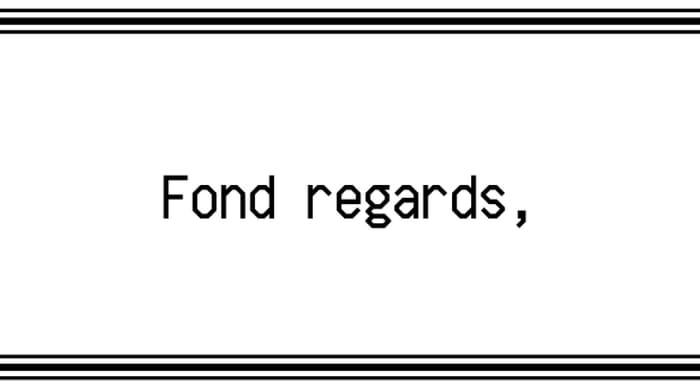Do All Emails End In Com
Sam handles a lot of email correspondence and strives to always have the perfect closing.

Do you ever finish writing a quick message only to get stuck for 10 minutes thinking, "How should I sign my email?" I know I do.
A proper email closing—also known as a valediction, valedictory close, or complimentary close—is the last part a person reads before your name and can make or break their attitude in response.
Maybe you've been using the same email sign-off for 10 years and need a change. Perhaps you accidentally gave a "thanks" in response to an email about your cousin's impending divorce or you're just not happy with a plain old "thanks" or "sincerely." If so, this list should give you some new ideas.
Tips on Choosing the Perfect Closing Sign-Off
If you already have an email signature or closing that includes your name and contact information, you might wonder if a valediction is necessary at all. And indeed, in many situations you can go with just your name or initials, especially if your contact information will appear right below it. However, if you included a salutation (e.g., "Hello", "Hey", or "Dear"), you should also include a valediction to close the email.
If you are having a hard time deciding, pick something that stands out to you and that won't be out of place in the relationship you have with the recipient. Try to stay close to the tone of the email. A good rule of thumb is to choose something you would be comfortable saying in person.
Classic Email Sign-Offs
- [Your name or initials] (ideally followed by a digital signature and contact information)
- Sincerely
- Thanks
- Thanks again
- Best
- Love
- Cheers
- Warmly
- Looking forward to your reply
- Regards
- Take Care

Formal Email Closings
- Fond regards
- Sincerely yours
- Cordially
- Kind regards
- Respectfully yours
- Yours sincerely
- Yours respectfully
- Cordially yours
- With sincere gratitude and appreciation
- Very respectfully
- Best regards
Advice for Formal Closings
If you're writing to a boss or colleague you know well, choose a professional business closing, but don't choose anything too formal. Reserve formal closings for doing business with people you are not yet familiar with.

How to End a Business Email Professionally
- Best regards
- Thanks for your consideration
- Kindest regards
- I await your reply with interest
- With anticipation
- Many thanks
- Cheers
- Respectfully
- Keep in touch
- I'll circle back
- Good luck
- Hope to hear from you soon
- Stay tuned
- Emphatically
- Keep me posted
- Looking forward to it
- Good work
- Solid work
- Great working with you
- Keep up the good work
- Feel free to give me a call
- Hoping you can work me in
- Hope this helps
- Let me know if you have any questions
- Let me know what you think
- Let me know soon
- I'll let you know soon
- Xx [Your name] (e.g. Xx Sam Mendoran)
Tip for Writing Business Emails
Stick to the point when writing business communications. The recipient probably deals with a lot of emails every day, so end the email with a call to action (usually, ask for their reply), and close it professionally. Remember, make it short and sweet.
Informal Ways to End an Email to a Colleague
- Wish you were here
- See you soon
- Be well
- Ciao
- Can't wait to hear from you
- Hope all is well
- Talk soon
- Very truly yours
- Yours
- Your friend
- Your pal
- Your [relation to recipient]
- All the best
- Best wishes
- Take care
- Fond regards
- Hugs
- Aloha
- Hasta La Vista
- See you around
- Peace and love
- Take it easy
- Peace be with you
- Blessings
- Our thoughts are with you
- Hoping for your continued blessings
- Until next time
- Safe travels
- Rock on
- Talk to you later (ttyl)
- Tata for now (ttfn)
- You're the best
- Later
Read More From Toughnickel
How to Close an Email to a Client
Never end an email to a client with "Let me know how I can help." It may seem innocent and accommodating, but clients will feel overwhelmed because they've hired you to do the job and come up with the ideas. Your clients are BUSY people, so don't ask them what they want...tell them what you plan on doing and ask if that plan sounds good to them.
By suggesting a next step, you are moving your client forward in the process, which gives them a sense that you're working hard to complete the project on time or even ahead of schedule, AND you are taking the pressure off of them to decide what to do next.
Tip for Getting a Quick Response
If you are hoping for a response or follow-up, pick a closing that indicates your interest, and use the sentences just before closing to give them a clue as to what type of response you are hoping for.

How to Close a Thank You Email
- Thank you
- Thanks for your help
- Thanks very much
- Thanks for your time
- Thanks for pointing me in the right direction
- Thanks in advance
- Thanks for your consideration
- Can't thank you enough
- It was a pleasure doing business with you
- Thanks a million
- I appreciate your time
- With appreciation
- Much appreciated
- Happy to help
- Let me know if you need anything
- Let me know what else I can do
- Let me know what looks good
- Let me know what looks interesting
- Stay Awesome
- You rock
- Rock and roll
- At your service
- You're the best
- Good job
- With gratitude
- Undying gratitude
- Everlasting gratitude

Casual and Funny Email Sign-Offs
Only use these if you and the person you're emailing have a close and friendly relationship. These should not be used for formal emails to clients.
- May the Force be with you
- Live long and prosper
- Only you can prevent forest fires
- These aren't the droids you're looking for
- Constant vigilance!
- Do, or do not
- Just my two cents
- Don't let the bedbugs bite
- From the mind of a genius
- Peace out
- I'll be back
- See ya later
- Later alligator
- Winter is coming
- Watch your back
- Remember the Alamo
- Stay hydrated
- To infinity and beyond
- Hakuna matata
- Keep on keepin' on
- Stay strong
- Signing off for now
- That's all for now
- Cheerio
- Eat your veggies
- Carpe Diem
- Onward and upward
- Take Care, Comb your hair
- May I always live to serve you and your crown
- Power to the people
- Stopping, Dropping, and Rolling
- "No trees were killed to send this message, but a large number of electrons were terribly inconvenienced." (h/t Neil deGrasse Tyson)

Email Closings for Business Events or Professional Occasions
- Happy holidays
- Hope you can make it
- Happy New Year
- Merry Christmas
- Joy and happiness
- Laughing all the way
- Enjoy your holiday
- Enjoy your vacation
- Enjoy your weekend
- Enjoy your [day of the week]
- Have a good one
- Have a good time
- Have a good day
- Have a great day
- Stay safe
- Hope you feel better soon
- Get well soon
- Sending you good vibes
- Glad you had a good time
- Please give them my best
- Say "Hi" to them for me
- Congratulations again
Final Advice
Stay away from religion. Unless you know your coworker, boss, or client really well and they are fond of religion, I recommend sticking to secular closings. If you know for a fact the recipient of the email is religious or they themselves close their emails with "God Bless," then you can reciprocate that sign-off, but the best practice is to avoid religious closings, just in case it makes anyone feel uncomfortable.
Careful With These
This article is accurate and true to the best of the author's knowledge. Content is for informational or entertainment purposes only and does not substitute for personal counsel or professional advice in business, financial, legal, or technical matters.
Do All Emails End In Com
Source: https://toughnickel.com/business/How-to-end-an-email
Posted by: humphreyhunty1956.blogspot.com

0 Response to "Do All Emails End In Com"
Post a Comment